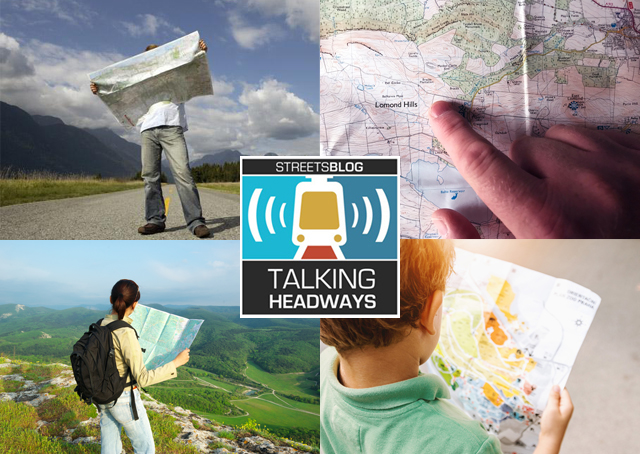This week, we're joined by Tim Fendley, founder and creative director at Applied. Fendley chats with us about lessons he's learned from doing wayfinding projects around the world (including Legible London), people’s ability to read maps, and giving people the confidence to get lost.
For those of you who prefer to read than listen, an excerpted transcript is below the audio player. If you want the full unedited transcript (and can put up with some typos), click here. It’s worth it.
Partial transcript:
Jeff Wood: So what’s the importance of the journey, getting from point a to point B in the process.
Tim Fendley: I think this makes me think about a wonderful quote from E.O.Wilson, which goes something like, "one of the issues with humanity is that we have Paleolithic emotions, medieval institutions, and God-like technology." And we’ve done a lot of studying about those paleolithic emotions, our ability to navigate, our ability to create pictures of places in our minds is from hundreds of thousands if not more years ago, instincts, if we couldn’t find where our camp was, where our cave was, you know, our family could die. It was pretty essential. So it’s a deep instinct that we’ve all got. I think what I’ve done as an orientier is being able to tap into that and know how to use it.
But modern life means a lot of people don’t need to tap into it, which makes them a little bit blind and they don’t have to be. So one thing about medieval institutions is that they will focus on the part of the journey that they’re responsible for, yet the experience from when you go to the shops or you're meeting a friend is from when you leave your house through to meeting them and getting back. For you, the experience is the journey. One issue that we have in the modern world, in our urban environments, is that when you’re on a journey, let’s just imagine you meet your friend. And then, I know can’t at the moment, but we will be doing that soon.
When you meet your friends and then journey back home. Again, you come across five, 10, 20 organizations in order to get there. You’ve got the organizer at your local council and you’ve got a, maybe a, somebody who put in the bus stop and you’ve got the bus service. You might using an app. You might be walking around the city center, et cetera. And one issue we have in cities is that these organizations don’t coordinate very well, and it creates a fractured journey. So one of the things that we’re always pointing out is connectivity of organizations is crucial to creating a journey that fits together. And there’s different ways of doing that.
Jeff Wood: You mentioned the Paleolithic city, one of the things that it makes me think about are those YouTube videos with cats, where they put the cucumber behind the cat and the cat jumps because it thinks it's a snake. It’s a kind of a cruel joke. You’re not really supposed to do that. It's mean to the cat, but it also makes me wonder what is the thing with humans that if you did something to them, they would freak out because of their paleolithic mind. And I think one of the things maybe is putting them in a place where they have no idea where they are and they just totally have a complete freakout and they don’t really know how to get themselves out of it.
Tim Fendley: That’s right. And I mean, one thing I wanted to point out was we often see research where you are asking people, what about your journey? Was your journey good, etc.. We saw some of this research from Heathrow and it was all reasonably positive. And then we asked, well where did they do the survey? And it was at the gate. So one thing that’s paleolithic is when we have a bad experience, we try and forget it. So if you ask people at the gate, they might have had a bad experience getting there, but they’re not necessarily going to tell you about it. And the other piece of research that we thought was really interesting is a lot of research has asked people when they’re on a transport system or they are walking around the city.
What about all of the people who won’t even get on the transport system or walk around the city because they are so uncertain, they’re not going to do it. They’re sat at home. They are not doing that journey. I’ve not seen much research at all that he’s trying to find out what those numbers of like, and this comes back to something that’s paleolithic, which is humans. As humans, look at the word on certainty. When you say something is uncertain, it’s a such a negative. The word lost is about uncertainty that people are lost in their life. It’s something as humans we avoid. We don’t like uncertainty. Look at the financial markets. What, what is the crash? It’s just uncertainty. It’s everybody being uncertain and it’s the same with transport, same with getting around and that factor of certainty and uncertainty.
It isn’t just, as we talk about it, some transport planners focus on this end rightly is a Legible City, the work we do is all about giving people more confidence and more freedom, more ability to make more use of a place, which actually is what the organization that runs that place wants. So, it actually is a very positive circle.






